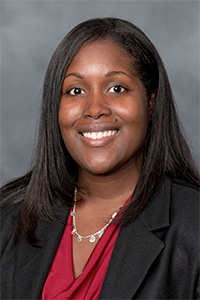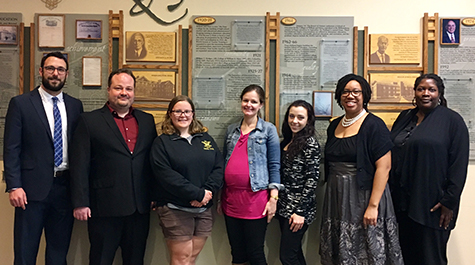Social Justice & Diversity Research Fellows at W&M tackle issues of equity
The Social Justice & Diversity Research Fellowship Program, now in its third year at William & Mary, aims to equip students to address issues of inequity in academia, in their professions and in their everyday lives.
Natoya Haskins, associate professor of counselor education, started the program in 2017 to address a critical scholarship gap in higher education. Research in the areas of social justice and diversity is a growing field, but one that is still underdeveloped and underpublished.
 Haskins’s aim is to make sure students at William & Mary have the resources and support to pursue rigorous research in these critical areas. “We have to show that this type of research is important and valued,” she says. "Not only can this research illuminate injustices in our communities, it gives researchers a vehicle to challenge constructs and institutions that perpetuate inequities and marginalization.”
Haskins’s aim is to make sure students at William & Mary have the resources and support to pursue rigorous research in these critical areas. “We have to show that this type of research is important and valued,” she says. "Not only can this research illuminate injustices in our communities, it gives researchers a vehicle to challenge constructs and institutions that perpetuate inequities and marginalization.”
The fellowship is open to any master’s or doctoral student at William & Mary. Although housed in the School of Education, the interdisciplinary nature of the program is one of its most valuable aspects, says participants.
“Through this program, I was able to partner up across disciplines with another graduate student to focus on a social justice issue,” says Nyx Robey M.S. ‘20, who graduated this spring with a master’s degree in experimental psychology. “We were able to approach this issue as partners, but also use our own fields of expertise to navigate the research.”
The fellowship is designed to support students as they learn practical, rigorous research skills, improve their writing, and gain exposure to the submission and editorial processes essential to being productive researchers.
For Haskins, the fellowship is a way for students to develop their emerging scholar identity and gain essential knowledge and confidence in their roles as researchers. “My hope is that fellows learn the methodological rigor and research integrity necessary to create new knowledge — knowledge that has the potential to uplift marginalized identities and challenge oppression.”
 Joining Haskins as co-director this year is Janise Parker, assistant professor of school psychology. She has long been involving both undergraduate and graduate students in her own research, with the goal of exposing them to issues of diversity and helping them understand how applied research can be used as a mechanism to address disparities in education.
Joining Haskins as co-director this year is Janise Parker, assistant professor of school psychology. She has long been involving both undergraduate and graduate students in her own research, with the goal of exposing them to issues of diversity and helping them understand how applied research can be used as a mechanism to address disparities in education.
“I hope the students walk away from this program with a ‘hunger’ for addressing disparities in their respective careers,” says Parker. “I also hope that students will feel empowered to serve as advocates for marginalized populations and recognize that their voice matters.”
Former fellows point to the influence of the program both in their work and in their personal lives.
Cassidy White J.D. ’19 joined the program during her final year in the William & Mary Law School. She is now in the Virginia Management Fellow program, a leadership and training program designed to develop talent for all branches of state government.
“At William & Mary, the Social Justice & Diversity Fellows program influenced how I approached various law assignments, such as interpreting statutory language or preparing a brief,” says White. “Now, as a young professional with the Commonwealth of Virginia, I use the lens of social justice, diversity and equity when approaching policy-related tasks and projects. This program also influenced how I approach my life — it encouraged me to actively dismantle oppressive systems through my own behavior.”
White points to the mentorship of faculty as a major benefit of joining the program. As a law student, her research experience was mainly focused on legal and literature-based research. She found that the program provided many supports for people who wanted to learn to conduct research and leverage it to achieve social justice-oriented goals.
Fellows work in teams of 4-5 students to explore their research interests and pursue a collaborative research project. Fellows are encouraged and supported in every step of this process, with the ultimate goal of presenting the research and, hopefully, getting published.
This spring, a team of two fellows and two faculty members submitted a manuscript to a major research journal. The article, “Disparities in Student Misconduct in Higher Education for Students from Underrepresented Racial Backgrounds or Non-Citizen Visa Status,” examined whether or not disparities exist for disciplinary outcomes due to race on a predominantly White college campus.
Robey is the lead author on the paper, along with fellow Rory Dunn ’18, M.A.Ed. ’19, Haskins and Cheryl Dickter, associate professor of psychological sciences. The project was the culmination of a cross-campus effort involving many offices. “This project helped me gain a broader understanding of higher education operations and how we work together as a campus to not just strengthen our on-campus student diversity, but support that diversity through inclusive measures,” says Robey.
Looking forward to the coming year, Parker anticipates that a major focus of the new cohort of fellows will be the educational and social disparities exacerbated by COVID-19. With public schools in the U.S. closed for much of the spring and plans for the fall uncertain, learning gaps will inevitably widen.
“It is my belief that research should inform practice and practice should inform research,” she says. “Hence, we hope to bridge these two worlds together, with the ultimate goal of ensuring that the needs of marginalized populations are not overlooked during the COVID-19 era.”
The application for the 2020-2021 cohort of Social Justice and Diversity Fellows is now open with a deadline of June 15, 2020. Graduate students from across the university are encouraged to apply.
“As a fellow, you will understand the critical need for social justice and diversity research and learn how to produce such research, all while engaging with new colleagues and gaining wisdom from distinguished professors and mentors,” says White.
Learn more about the Social Justice & Diversity Fellows program and apply online.
